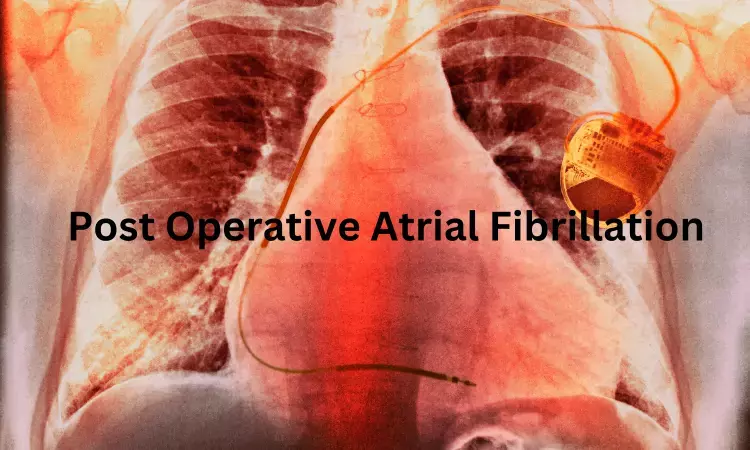- Home
- Medical news & Guidelines
- Anesthesiology
- Cardiology and CTVS
- Critical Care
- Dentistry
- Dermatology
- Diabetes and Endocrinology
- ENT
- Gastroenterology
- Medicine
- Nephrology
- Neurology
- Obstretics-Gynaecology
- Oncology
- Ophthalmology
- Orthopaedics
- Pediatrics-Neonatology
- Psychiatry
- Pulmonology
- Radiology
- Surgery
- Urology
- Laboratory Medicine
- Diet
- Nursing
- Paramedical
- Physiotherapy
- Health news
- Fact Check
- Bone Health Fact Check
- Brain Health Fact Check
- Cancer Related Fact Check
- Child Care Fact Check
- Dental and oral health fact check
- Diabetes and metabolic health fact check
- Diet and Nutrition Fact Check
- Eye and ENT Care Fact Check
- Fitness fact check
- Gut health fact check
- Heart health fact check
- Kidney health fact check
- Medical education fact check
- Men's health fact check
- Respiratory fact check
- Skin and hair care fact check
- Vaccine and Immunization fact check
- Women's health fact check
- AYUSH
- State News
- Andaman and Nicobar Islands
- Andhra Pradesh
- Arunachal Pradesh
- Assam
- Bihar
- Chandigarh
- Chattisgarh
- Dadra and Nagar Haveli
- Daman and Diu
- Delhi
- Goa
- Gujarat
- Haryana
- Himachal Pradesh
- Jammu & Kashmir
- Jharkhand
- Karnataka
- Kerala
- Ladakh
- Lakshadweep
- Madhya Pradesh
- Maharashtra
- Manipur
- Meghalaya
- Mizoram
- Nagaland
- Odisha
- Puducherry
- Punjab
- Rajasthan
- Sikkim
- Tamil Nadu
- Telangana
- Tripura
- Uttar Pradesh
- Uttrakhand
- West Bengal
- Medical Education
- Industry
Anti inflammatory drug Colchicine may prevent atrial fibrillation after cardiac surgery

Post-operative atrial fibrillation (POAF) is a tenacious serious surgical complication that occur in 20-55% of cardiac surgery cases. POAF may lead to adverse health outcomes such as stroke, thromboembolism, cardiac arrest, and mortality, and is the leading cause of death among cardiac patients.
About 90% of patients who develop POAF is said to occur within the first six days post operation, corresponding with the peak of the postoperative systemic inflammation response. POAF is a predictor of early- and long-term cardiovascular complications such as stroke, thromboembolism, infection, cardiac arrest, and the need for reoperation due to internal bleeding
Dr Siddharth Agarwal, MD and team in a recent study aimed to compare the efficacy and safety of colchicine versus placebo to prevent POAF in patients undergoing cardiac surgery and revealed that the recently approved anti-inflammatory colchicine, opens in a new tab or window for cardiovascular prevention (under the trade name Lodoco), appeared to offer protection from postoperative atrial fibrillation in the present meta-analysis. The study is published in EP Europace journal.
Researchers conducted a systematic search of EMBASE, MEDLINE, SCOPUS, ClinicalTrials.gov, and the Cochrane Library for randomized controlled trials (RCTs) was conducted from inception till April 2023. The primary outcome was the incidence of POAF after any cardiac surgery. The secondary outcome was the rate of drug discontinuation due to adverse events and adverse gastrointestinal events. Risk ratios (RR) were reported using the Mantel Haenszel method.
The key findings of the study are
• A total of 8 RCTs comprising 1,885 patients were included. There was a statistically significant lower risk of developing POAF with colchicine vs. placebo (RR: 0.70; 95% CI: 0.59-0.82; p<0.01, I2=0%), and this effect persisted across different subgroups.
• There was a significantly higher risk of adverse gastrointestinal events (RR: 2.20; 95% CI: 1.38-3.51; p<0.01, I2=55%) with no difference in the risk of drug discontinuation in patients receiving colchicine vs. placebo (RR: 1.33; 95% CI: 0.93-1.89; p=0.11, I2=0%).
In conclusion, This meta-analysis of 8 RCTs showed that colchicine is effective at preventing POAF, with a significantly higher risk of adverse gastrointestinal events but no difference in the rate of drug discontinuation. Future studies are required to define the optimal duration and dose of colchicine for the prevention of POAF.
Reference: Siddharth Agarwal, MD and others, Safety and Efficacy of Colchicine for the Prevention of Post-Operative Atrial Fibrillation in Patients Undergoing Cardiac Surgery: A Meta-Analysis of Randomized Controlled Trials, EP Europace, 2023;, euad169, https://doi.org/10.1093/europace/euad169.
MSc. Neuroscience
Niveditha Subramani a MSc. Neuroscience (Faculty of Medicine) graduate from University of Madras, Chennai. Ambitious in Neuro research having worked in motor diseases and neuron apoptosis is interested in more of new upcoming research and their advancement in field of medicine. She has an engrossed skill towards writing and her roles at Medical dialogue include Sr. Content writer. Her news covers new discoveries and updates in field of medicine. She can be reached at editorial@medicaldialogues.in
Dr Kamal Kant Kohli-MBBS, DTCD- a chest specialist with more than 30 years of practice and a flair for writing clinical articles, Dr Kamal Kant Kohli joined Medical Dialogues as a Chief Editor of Medical News. Besides writing articles, as an editor, he proofreads and verifies all the medical content published on Medical Dialogues including those coming from journals, studies,medical conferences,guidelines etc. Email: drkohli@medicaldialogues.in. Contact no. 011-43720751


